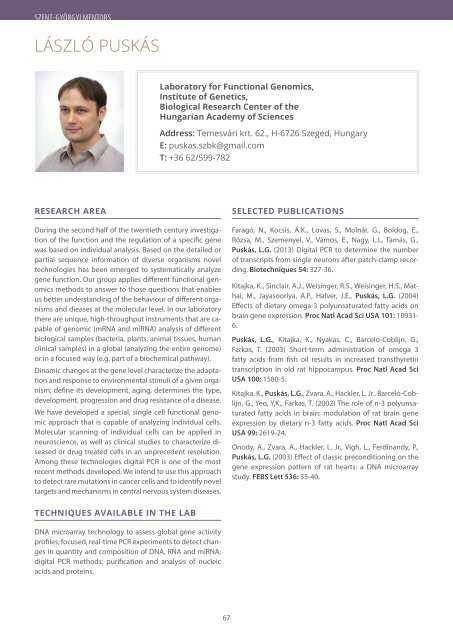SzSA YearBook 2016/17
Create successful ePaper yourself
Turn your PDF publications into a flip-book with our unique Google optimized e-Paper software.
SZENT-GYÖRGYI MENTORS<br />
LÁSZLÓ PUSKÁS<br />
Laboratory for Functional Genomics,<br />
Institute of Genetics,<br />
Biological Research Center of the<br />
Hungarian Academy of Sciences<br />
Address: Temesvári krt. 62., H-6726 Szeged, Hungary<br />
E: puskas.szbk@gmail.com<br />
T: +36 62/599-782<br />
RESEARCH AREA<br />
During the second half of the twentieth century investigation<br />
of the function and the regulation of a specific gene<br />
was based on individual analysis. Based on the detailed or<br />
partial sequence information of diverse organisms novel<br />
technologies has been emerged to systematically analyze<br />
gene function. Our group applies different functional genomics<br />
methods to answer to those questions that enables<br />
us better understanding of the behaviour of different organisms<br />
and dieases at the molecular level. In our laboratory<br />
there are unique, high-throughput instruments that are capable<br />
of genomic (mRNA and miRNA) analysis of different<br />
biological samples (bacteria, plants, animal tissues, human<br />
clinical samples) in a global (analyzing the entire genome)<br />
or in a focused way (e.g. part of a biochemical pathway).<br />
Dinamic changes at the gene level characterize the adaptation<br />
and response to environmental stimuli of a given organism;<br />
define its development, aging, determines the type,<br />
development, progression and drug resistance of a disease.<br />
We have developed a special, single cell functional genomic<br />
approach that is capable of analyzing individual cells.<br />
Molecular scanning of individual cells can be applied in<br />
neuroscience, as well as clinical studies to characterize diseased<br />
or drug treated cells in an unprecedent resolution.<br />
Among these technologies digital PCR is one of the most<br />
recent methods developed. We intend to use this approach<br />
to detect rare mutations in cancer cells and to identify novel<br />
targets and mechanisms in central nervous system diseases.<br />
SELECTED PUBLICATIONS<br />
Faragó, N., Kocsis, Á.K., Lovas, S., Molnár, G., Boldog, E.,<br />
Rózsa, M., Szemenyei, V., Vámos, E., Nagy, L.I., Tamás, G.,<br />
Puskás, L.G. (2013) Digital PCR to determine the number<br />
of transcripts from single neurons after patch-clamp recording.<br />
Biotechniques 54: 327-36.<br />
Kitajka, K., Sinclair, A.J., Weisinger, R.S., Weisinger, H.S., Mathai,<br />
M., Jayasooriya, A.P., Halver, J.E., Puskás, L.G. (2004)<br />
Effects of dietary omega-3 polyunsaturated fatty acids on<br />
brain gene expression. Proc Natl Acad Sci USA 101: 10931-<br />
6.<br />
Puskás, L.G., Kitajka, K., Nyakas, C., Barcelo-Coblijn, G.,<br />
Farkas, T. (2003) Short-term administration of omega 3<br />
fatty acids from fish oil results in increased transthyretin<br />
transcription in old rat hippocampus. Proc Natl Acad Sci<br />
USA 100: 1580-5.<br />
Kitajka, K., Puskás, L.G., Zvara, A., Hackler, L. Jr., Barceló-Coblijn,<br />
G., Yeo, Y.K., Farkas, T. (2002) The role of n-3 polyunsaturated<br />
fatty acids in brain: modulation of rat brain gene<br />
expression by dietary n-3 fatty acids. Proc Natl Acad Sci<br />
USA 99: 2619-24.<br />
Onody, A., Zvara, A., Hackler, L. Jr., Vígh, L., Ferdinandy, P.,<br />
Puskás, L.G. (2003) Effect of classic preconditioning on the<br />
gene expression pattern of rat hearts: a DNA microarray<br />
study. FEBS Lett 536: 35-40.<br />
TECHNIQUES AVAILABLE IN THE LAB<br />
DNA microarray technology to assess global gene activity<br />
profiles; focused, real-time PCR experiments to detect changes<br />
in quantity and composition of DNA, RNA and miRNA;<br />
digital PCR methods; purification and analysis of nucleic<br />
acids and proteins.<br />
67












